'The sense of Constitutional propriety and political morality seems to be vanishing fast.'
'There are many things in today's politics of governance which Manmohan Singh would have never dreamt of saying or doing.'
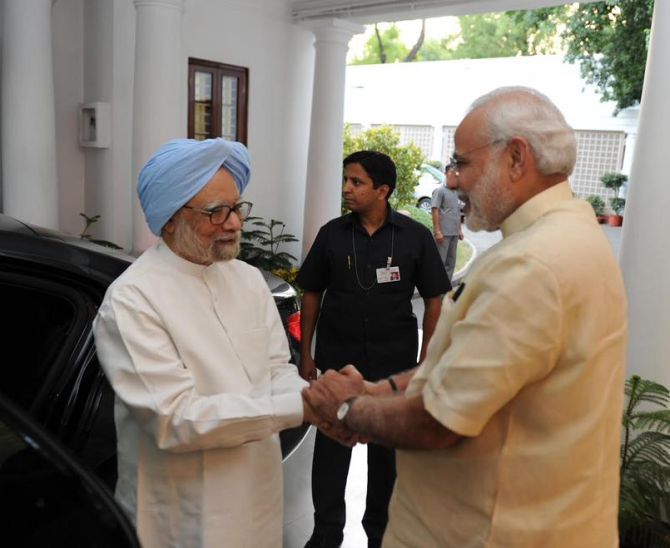
Retired IAS officer, 85-year-old Thottuvelil Krishna Pillai Ayappan Nair has the unique distinction of having served in the prime minister offices of Inder Kumar Gujral, Atal Bihari Vajpayee and Dr Manmohan Singh.
Mr Nair was principal secretary and advisor to Dr Singh, with the rank of minister of state.
He joined the Punjab cadre of the Indian Administrative Service in 1963, served as the state's chief secretary before being assigned to the Centre as a secretary, Government of India in different capacities.
Rediff.com's Shobha Warrier met Mr Nair at his residence in Thiruvananthapuram and spoke to him about the prime ministers he had served and, of course, Prime Minister Narendra Damodardas Modi.
Part one of a multi-part interview:
How different is the politics you were associated with and the politics of today?
My association with politicians as a government official is very old, but politics and politicians are changing by the day.
Talking about the politics and the politicians I was familiar with may not be very relevant today, and I feel out of tune with the times.
Briefly put, there is no comparison between the highly divisive, aggressive, no holds-barred politics of today, and the politics of old times.
The soft spoken, self-effacing, scholarly statesman like Manmohan Singh as PM was a far cry from our ebullient, supercharged, supremely self-confident PM of today driven by his missionary zeal to build an India of his vision, that is Bharat.
Dr Manmohan Singh was not a political leader in the usual sense when he became prime minister.
True, he was one of the most successful finance ministers who steered the country in the throes of a financial crisis, and was well conversant with issues of governance.
The position of prime minister came to him not through cut-throat manipulative political processes or Chanakya-like political acumen. He was not an elected PM, and that made a world of difference. He was fully aware of the constraints on him.
His attitude to politics and his approach to matters relating to governance were also different from those of the present prime minister. As I said, there is no comparison.
You mean, he approached issues from the point of view of an administrator and an economist, and the other elected prime ministers including Narendra Modi from the political point of view?
That's right. From the way I look at it, present day politics and present day governance are totally attuned to electoral prospects and calculation.
Ways and means of coming back to power are the most determinant factor influencing governance today.

Would you say, by any means?
Well, I am tempted to go to the extent of saying, by almost any means. I know it is a very sweeping statement to make.
So, let's put it this way, 'by all means' which would conceivably bring electoral advantage, provided they are within the limits of the law and the Constitution.
Here again, I would have to say that at times attempt have been made to stretch the law and the Constitution, which have evoked severe criticism.
The sense of Constitutional propriety and political morality seems to be vanishing fast.
There are many things in today's politics of governance which Manmohan Singh would have never dreamt of saying or doing. I am quite certain about it. Therefore, I would say the basic thrust and objective of governance has changed.
Electoral success in the pursuit of absolute power seems to be the raison d'etre of governance today.
As a person who was associated with the Indian political scene till Dr Manmohan Singh's time, does it worry you to see the way things are happening now?
Yes, in some ways there are developments which cause concern. Let me hasten to add that many progressive changes and welcome developments are also taking place today, sometimes at breakneck speed.
The prime minister deserves great credit for initiating and pursuing badly needed and highly desirable development projects embracing mobility, communication, healthcare, education and emerging technologies.
Would you say, you didn't see this kind of push even during UPA1?
No, not to this extent.
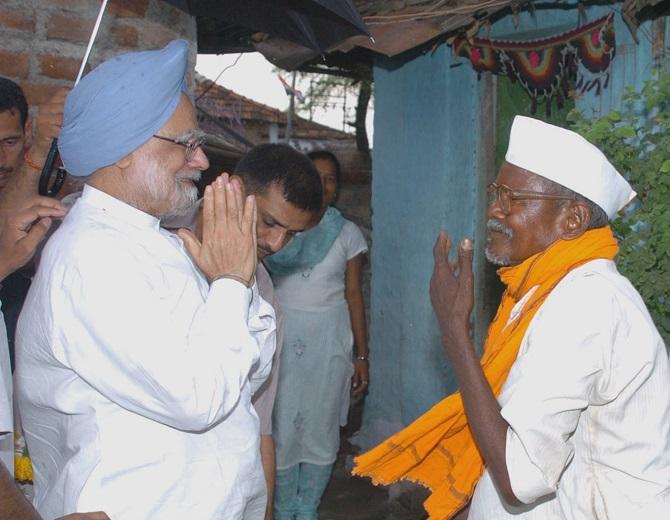
One criticism against the Modi government is that the gap between the rich and the poor has widened, and the main beneficiaries of the development activities are very few capitalists.
Did it happen this way earlier too, or is it more now?
The criticism is valid. Manmohan Singh was never against industrialists or corporates, but the extent to which corporates are promoted by the current government is unparallel in the history of India.
An Oxfam study which I read recently shows clearly how the rich are getting richer, and the poor are not getting uplifted at the same speed and are lagging far behind.
Questioning the reliability of the study, the government claims that many lakhs of people have been lifted above the poverty line during the last 9 years.
Even if it is granted, still, there is a huge mass of impoverished people who are denied the minimum basic necessities of life.
Manmohan Singh would have given greater attention and priority to such plans and activities like MNREGA which would have directly benefitted the poorer sections.
The trickling down effect of economic developments is not happening significantly for benefiting large sections of marginalised society.
That's one basic grievance against the present government.
At the same time, as I said earlier large-scale development is taking place in terms of building better infrastructure.
And the prime minister pursues and monitors implementation of projects more vigorously than any other prime minister in the past.
While giving full credit to the prime ,inister for his development agenda and the GDP growth, the question is, what kind of impact do they have on the large mass of people.
Regrettably hunger, malnutrition and unemployment still persist, and make life miserable for millions.
Trumpeting GDP growth to the deprived is a joke on them.
- Part 2 of the Interview: 'If Modi wins a third term...'
Feature Presentation: Aslam Hunani/Rediff.com



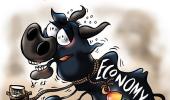
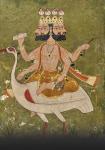


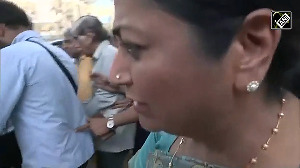


 © 2025
© 2025